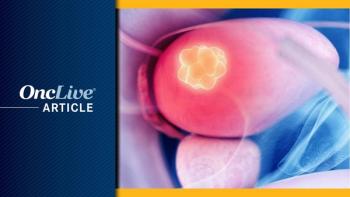
Dr Gupta on Criteria for the EV-103 Trial in Advanced Urothelial Cancer

Shilpa Gupta, MD, discusses the enrollment criteria used for the phase 1/2 EV-103 trial in patients with locally advanced or metastatic urothelial carcinoma, and highlights next steps for the investigation of the frontline combination of enfortumab vedotin and pembrolizumab in the phase 3 EV-302 trial.
Shilpa Gupta, MD, director, Genitourinary Medical Oncology, Taussig Cancer Institute, co-leader, Genitourinary Oncology Program, Cleveland Clinic, discusses the enrollment criteria used for the phase 1/2 EV-103 trial (NCT03288545) in patients with locally advanced or metastatic urothelial carcinoma, and highlights next steps for the investigation of the frontline combination of enfortumab vedotin-ejfv (Padcev) and pembrolizumab (Keytruda) in the phase 3 EV-302 trial (NCT04223856).
Long-term follow-up data from EV-103 presented at the 2023 ASCO Annual Meeting showed that at median follow-up of 47 months data for patients enrolled in the dose-escalation portion of the study and cohort A, frontline enfortumab vedotin plus pembrolizumab elicited an overall response rate of 73.3% (95% CI, 58.1%-85.4%) per blinded independent central review (BICR) and a concordance rate of best overall response of 95.3% between BICR and investigator assessments. Cohort A and the dose escalation included 45 patients with locally advanced and metastatic urothelial cancer who were ineligible to receive cisplatin.
Notably, previous data from these cohorts and results from the randomized cohort K of previously untreated, cisplatin-ineligible patients who received enfortumab vedotin plus pembrolizumab or enfortumab vedotin monotherapy, supported the accelerated
The confirmatory, phase 3 EV-302 trial will compare enfortumab vedotin plus pembrolizumab vs standard-of-care platinum-based chemotherapy. Unlike the phase 1/2 study, EV-302 will enroll all comers, irrespective of cisplatin eligibility, Gupta says. In the control arm, patients will receive chemotherapy consisting of gemcitabine plus cisplatin, and if patients are ineligible for cisplatin, they will be administered gemcitabine plus carboplatin. The phase 3 study has completed enrollment, and initial results are anticipated in the coming year, Gupta concludes.



































